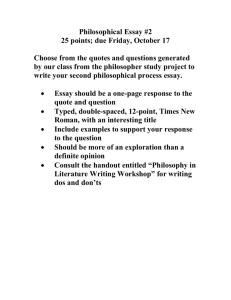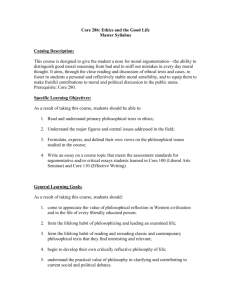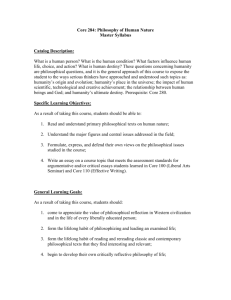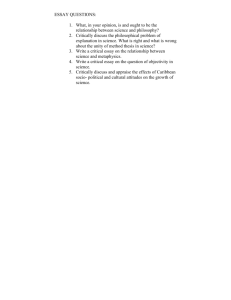The Good Life - Sydney Penner
advertisement
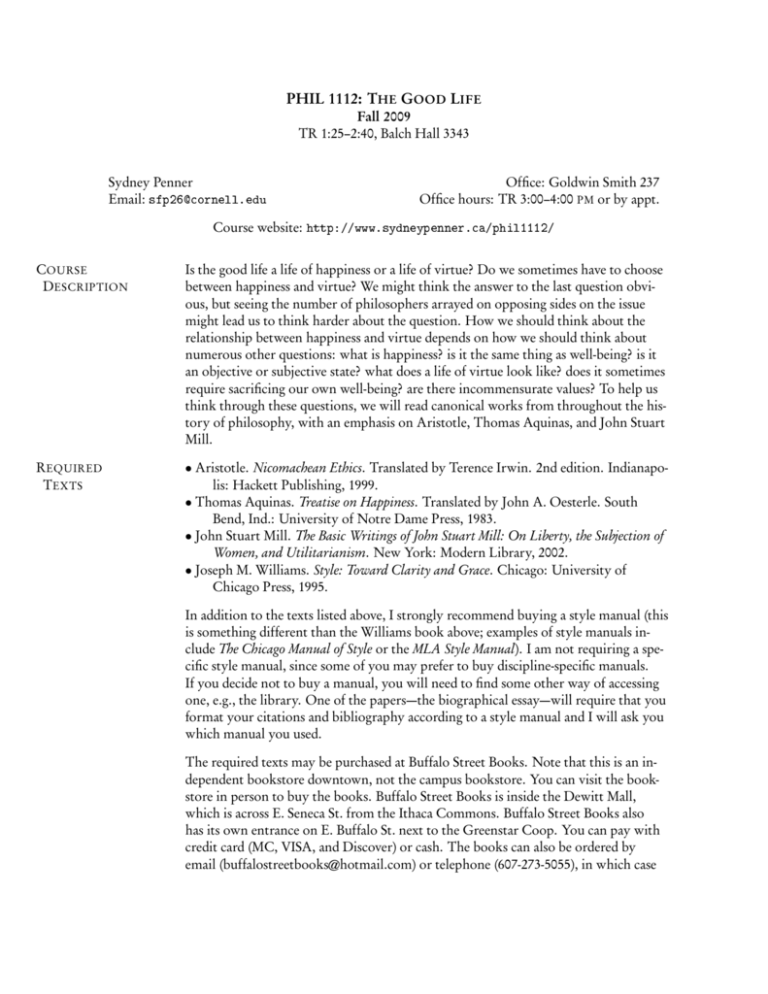
PHIL 1112: THE GOOD LIFE Fall 2009 TR 1:25–2:40, Balch Hall 3343 Sydney Penner Email: sfp26@cornell.edu Office: Goldwin Smith 237 Office hours: TR 3:00–4:00 PM or by appt. Course website: http://www.sydneypenner.ca/phil1112/ COURSE DESCRIPTION Is the good life a life of happiness or a life of virtue? Do we sometimes have to choose between happiness and virtue? We might think the answer to the last question obvious, but seeing the number of philosophers arrayed on opposing sides on the issue might lead us to think harder about the question. How we should think about the relationship between happiness and virtue depends on how we should think about numerous other questions: what is happiness? is it the same thing as well-being? is it an objective or subjective state? what does a life of virtue look like? does it sometimes require sacrificing our own well-being? are there incommensurate values? To help us think through these questions, we will read canonical works from throughout the history of philosophy, with an emphasis on Aristotle, Thomas Aquinas, and John Stuart Mill. REQUIRED TEXTS • Aristotle. Nicomachean Ethics. Translated by Terence Irwin. 2nd edition. Indianapolis: Hackett Publishing, 1999. • Thomas Aquinas. Treatise on Happiness. Translated by John A. Oesterle. South Bend, Ind.: University of Notre Dame Press, 1983. • John Stuart Mill. The Basic Writings of John Stuart Mill: On Liberty, the Subjection of Women, and Utilitarianism. New York: Modern Library, 2002. • Joseph M. Williams. Style: Toward Clarity and Grace. Chicago: University of Chicago Press, 1995. In addition to the texts listed above, I strongly recommend buying a style manual (this is something different than the Williams book above; examples of style manuals include The Chicago Manual of Style or the MLA Style Manual). I am not requiring a specific style manual, since some of you may prefer to buy discipline-specific manuals. If you decide not to buy a manual, you will need to find some other way of accessing one, e.g., the library. One of the papers—the biographical essay—will require that you format your citations and bibliography according to a style manual and I will ask you which manual you used. The required texts may be purchased at Buffalo Street Books. Note that this is an independent bookstore downtown, not the campus bookstore. You can visit the bookstore in person to buy the books. Buffalo Street Books is inside the Dewitt Mall, which is across E. Seneca St. from the Ithaca Commons. Buffalo Street Books also has its own entrance on E. Buffalo St. next to the Greenstar Coop. You can pay with credit card (MC, VISA, and Discover) or cash. The books can also be ordered by email (buffalostreetbooks@hotmail.com) or telephone (607-273-5055), in which case Course Syllabus PHIL 1112 – The Good Life you can pay with credit card. When you place your order, be sure to have your credit card number and expiration date ready, as well as the instructor’s name (Sydney Penner) and the course number (PHIL 1112). If you order by phone or email, the books will be delivered to our second class meeting (September 1). Additional readings will be either handed out in class or scanned and posted to the course website for you to print. COURSE OBJECTIVES This course is both a philosophy course and a writing course. As such, it has two primary objectives: (i) learn how to think with rigour about questions related to happiness and moral virtue and (ii) learn how to present sound and persuasive arguments in writing with clarity and precision. Sometimes these two objectives will support each other in happy synergy; sometimes, no doubt, they will seem to be in competition. Regardless, we shall attempt to keep both objectives in mind through the semester. We can break up the primary objectives—and add a secondary objective along the way—as follows: Objective One: Think with rigour about happiness and virtue and the relationship between them. This objective should be clear by now. Objective Two: Start becoming familiar with several canonical philosophical texts, especially Aristotle’s Nicomachean Ethics, Aquinas’s Treatise on Happiness (a part of his Summa Theologiæ), and Mill’s Utilitarianism. The goal is not merely to mine these texts for the bits relevant to the questions on which we are primarily focusing. Think of those questions as our entry point into these texts. But if we stumble across other material in the texts that interests us, there is no need to pass it by on grounds that it is irrelevant. Objective Three: Develop the ability to recognize and formulate sound and persuasive arguments. We all know how to make good arguments and recognize bad arguments in most of the ordinary contexts of daily life without giving explicit thought to the matter. But our intuitive sense often starts failing us when we start arguing about subjects with which we are less familiar, especially if these subjects involve highly abstract concepts. In order to improve our argumentative ability, we will spend time thinking explicitly about making arguments and responding to them. Objective Four: Improve the ability to write with clarity and precision. As with arguing, in many contexts our intuitive sense of language serves us well. But sometimes it helps to think explicitly about how we write, about why we say something in one way rather than another. To that end, we will work to develop a vocabulary for talking about writing and will then apply what we learn to our own writing. Objective Five: Practice reading texts closely with a critical but charitable eye. We can all read. But there is a vast difference between mere reading and careful, critical, charitable reading. The three adjectives indicate three areas I particularly hope to cultivate in this course. August 27, 2009 2 Course Syllabus COURSE REQUIREMENTS PHIL 1112 – The Good Life Attendance and Participation: Regular attendance and participation is mandatory. I will give you two excused absences without requiring you to provide the reason for your absence, i.e., all you have to do is email me in advance saying that you will not be able to make it to class. I strongly recommend using these two absences with caution, since a third excused absence will require a very good reason indeed. Come see me if you think you have said very good reason. Any in-class assignments missed as a result of an absence must still be completed. Also, I would recommend finding out from a classmate what you missed. The mere presence of your body will not get you an A for participation. I expect you to come to class having done the readings and prepared to engage in discussion. I will not prepare scintillating lectures for this course since I intend our time to be taken up by discussion. Hence, if you do not come prepared to contribute, you will have to suffer through a very painful, one-sided “discussion.” I realize that verbal participation comes more naturally to some of us than others, so I will not require that all of you contribute equally to the discussion. But I can tell whether you are attending to the discussion even if you do not open your mouth. You will also be asked to do one short presentation to the class. The presentation will be based on the research you will have done for the biographical essay and so should not require much additional preparation. In-class Exercises: There will be frequent short exercises to be completed at the beginning of class. They serve a pedagogical purpose (to start applying/think more about the material on writing and argumentation you have read) and a diagnostic purpose (to give me a better sense of what you have adequately mastered and what needs more time). Doing the readings should be adequate preparation for these exercises—no need for additional studying. Also, you will receive full credit for any exercise completed with reasonable effort. Conferences: We will schedule individual conferences during the draft stages of two of the essays. You are, of course, welcome at any point in the term to stop by during office hours or to make an appointment to see me to discuss the philosophical subject matter of the course or your writing. Plagiarism Quiz: You must take an online plagiarism quiz, score 100%, and have the system email me the results before I will grade any of your assignments. You may take the quiz as many times as you need to achieve a perfect score. Once you have achieved a perfect score, have the system email me the results (sfp26@cornell.edu). The quiz is online, along with a helpful tutorial, at: http://plagiarism.arts.cornell.edu/tutorial/index.cfm Analytic Reading Responses: These reading responses will come in two varieties. For some, I will ask you to identify and analyse the main argument (or one of the main arguments) in the philosophical reading for the week and provide a brief evaluative response. For others, I will ask you to find a statement that strikes you as crazy, strange, or puzzling, tell me why it strikes you that way, and try to suggest reasons for why the author might have made such a statement. The main purpose for these reading responses is to encourage a closer engagement with the texts and to leave you ready for productive and rewarding discussion in class. They also provide you with a chance August 27, 2009 3 Course Syllabus PHIL 1112 – The Good Life to start playing around with arguments that you may want to develop further in later papers. Recycling material from your reading responses for a later paper is a great idea. You will be asked for reading responses most weeks for a total of eleven responses (each response one to two pages long). Responses will be graded (on a coarse scale of fail, acceptable, and good); the three lowest grades will be dropped. Philosophical Essays: Given that this is a writing seminar, the main requirement, of course, will be the essays. Five of the essays will be philosophical in nature. Some essays will ask you to interpret a philosophical text, some to formulate your own arguments in defense of a philosophical position, and some a combination of both. Several of the essays will go through multiple stages of revision. Some essays will be on assigned topics; some on topics you propose. Length requirements will range from 700–1000 words (approximately 3–4 pages) to 2000–3000 words (approximately 8–12 pages). Biographical Essay: You will also be asked to pick one of the philosophers we are reading for this course and then write a 1000–1500-word essay on some aspect of his life. You can choose any aspect you find interesting. None of the philosophical essays will require any use of secondary sources, but I will ask you to do some library research for this one. GRADING Class attendance and participation — 10% In-class exercises — 10% Analytic reading responses — 20% Philosophical essay 1 — 5% Philosophical essay 2 — 5% Philosophical essay 3 — 10% Philosophical essay 4 — 10% Philosophical essay 5 — 20% Biographical essay — 10% In addition, note the following constraint: an F in any of the parts listed above will result in an F for the course. This just means that you should not blow off any part of the course on grounds that it does not contribute much to the course grade. In case this constraint worries you, let me assure you that you need not worry about getting an F as long as you put anything resembling reasonable effort into an assignment. ACADEMIC INTEGRITY My standard policy for plagiarism is failure in the course. No second chances. The only cases where I will even consider a more lenient penalty are cases involving minor plagiarism of the sort where I think that it could possibly have happened innocently (in such cases, I will ask you to complete a new, relevantly similar assignment). Copying paragraphs from Wikipedia does not happen innocently. Note, too, that the requirement that you pass a plagiarism quiz diminishes the plausibility of innocent offenses. I am, of course, happy to talk about any questions you might have about what constitutes plagiarism. Do not worry too much, however, about borderline cases. Just do not expect leniency from me in flagrant cases. Violations may, of course, have even more severe consequences than those imposed by me, e.g., expulsion from the university. See Cornell’s Code of Academic Integrity: http://www.cuinfo.cornell.edu/Academic/AIC.html. August 27, 2009 4 Course Syllabus EXTENSIONS AND L ATE PENALTIES PHIL 1112 – The Good Life I have no interest in policing your activities and making sure that you have legitimate excuses when you request extensions. Hence, you get two extensions without needing to provide me with an excuse, although you are still required to notify me in advance. One extension can be up to a week and the other one can be up until the subsequent class period (though not over a holiday). In cases of work going through multiple stages, subsequent stages will also receive extensions (albeit diminishing ones) as necessary in order to make the initial extension meaningful. Any additional extensions will come very reluctantly, so only use these two “free” extensions if and when you really need them. Realize that I am hereby providing you with the means to destroy yourself. Take a good look at the course calendar and ask yourself whether you really want to add another assignment to the period shortly after it was initially due. Failing an extension, an assignment will have a third of a letter grade deducted if received later in the day, a full letter grade if received the following day, and an additional third of a letter grade for each additional day it is late. SPECIAL ACCOMMODATIONS If you require any special accommodations for reasons related to religious observance, athletics, disabilities, and the like, do not hesitate to let me know. I will be happy to work with you in arranging appropriate accommodations for those requirements. Letting me know sooner is better than later. MISCELLANEOUS POLICIES Please refrain from using electronic devices in class. I want the classroom to be a place where we engage in genuine, thoughtful discussion—electronic devices by and large do not contribute to that goal. Note that this policy includes laptops.1 As for cellphones, I do not own one—I will leave it to you to imagine my attitude towards them. Unexpected class cancellations will be announced by email. If you have a chance, you might want to check your email before heading to class, especially on snowy days (I live on a steep hill in the country). If possible, I will also have the cancellation posted on the classroom door. Do not try to find my telephone number and call me—by far the best way to contact me is by email. I will try to respond to emails within 24 hours. The Knight Institute Writing Walk-In Service The Writing Walk-In Service operates out of five campus locations on Central, North, and West campuses. During the academic year, the WWIS is open Sunday through Thursday from 3:30– 5:30pm and from 7:00–10:00pm. Writers can schedule appointments or they can drop in at a convenient time. Please consult our website for more detailed information: http://www.arts.cornell.edu/writing 1 If you are interested in seeing a justification for keeping laptops out of classrooms, see the following piece: Kevin Yamamoto, “Banning Laptops in the Classroom: Is It Worth the Hassle?”, Journal of Legal Education 57 (2008): 1–46. August 27, 2009 5
